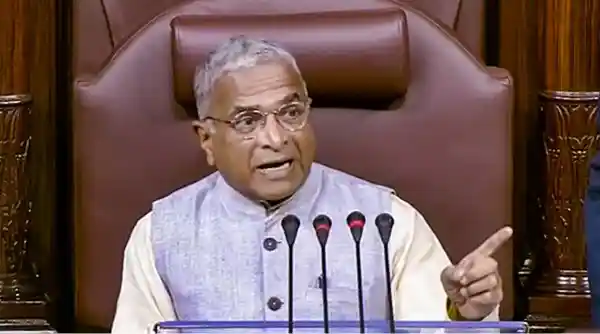Harivansh Narayan Singh steps in as Rajya Sabha Chairman after Dhankhar’s resignation
In a significant political development, Vice President of India and Chairman of the Rajya Sabha, Jagdeep Dhankhar, has tendered his resignation citing health concerns. His resignation, submitted in accordance with Article 67(a) of the Constitution, is effective immediately. Dhankhar, who took office in 2022, had a tenure lasting until 2027. The resignation came on the opening day of the Monsoon session of Parliament.
Following this, Deputy Chairman Harivansh Narayan Singh will preside over the Rajya Sabha as interim chair until a new Vice President is elected.

Who is Harivansh Narayan Singh?
Harivansh Narayan Singh, the current Deputy Chairman of the Rajya Sabha, is an acclaimed journalist and politician representing Bihar. He has been a Rajya Sabha member since 2014 and was first elected as Deputy Chairman in 2018 as the candidate of the National Democratic Alliance (NDA), defeating the opposition candidate by 125 to 105 votes. Notably, he is the third person in history and the first in 40 years to hold the post who does not belong to the Indian National Congress.
He was re-elected as Deputy Chairman on 14 September 2020 after returning to the Rajya Sabha for his second term from Bihar. His tenure in the role has been marked by efficiency and impartiality in presiding over House proceedings.
What does the Constitution say?
The Constitution provides that in the event of a vacancy in the Vice President’s office, the Deputy Chairman of the Rajya Sabha or another member authorised by the President of India may discharge the duties of the chairperson of the Rajya Sabha (Council of States).
The Vice President’s position will remain vacant until the electoral college comprising members of both the Lok Sabha and Rajya Sabha elects a successor. Candidates for the position must be Indian citizens aged at least 35 years, eligible for membership in the Rajya Sabha, and free from holding any office of profit.
When will the elections for Vice President be held?
While the Constitution mandates that Vice Presidential elections be held “as soon as possible” following a vacancy, no fixed timeline exists in cases of resignation. Typically, elections are conducted under the Presidential and Vice-Presidential Elections Act, 1952, with the schedule announced by the Election Commission of India.
Once announced, voting takes place in Parliament House, New Delhi, through a secret ballot. MPs from both houses cast votes, ranking candidates in order of preference. The candidate securing the highest number of first-preference votes is elected and will serve a full five-year term extending to 2030.
Until then, Harivansh Narayan Singh will oversee the proceedings of the Upper House, ensuring continuity and stability in legislative business.
